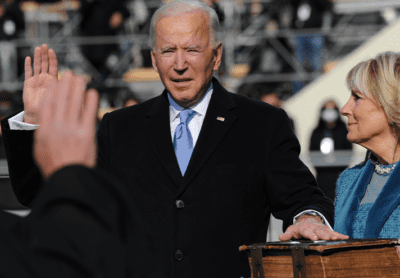Senator Michael Bennet has become the first Democratic senator to publicly question President Joe Biden’s chances in the upcoming election. Speaking to CNN, Bennet expressed his belief that Biden could lose to former President Donald Trump by a significant margin, though he stopped short of calling for the president to end his candidacy. This statement comes on the heels of seven congressmen urging the 81-year-old president to step aside.
Bennet’s remarks add to the growing concerns about Biden’s fitness for office, especially following his stumbling performance in a recent presidential debate against Trump. Despite these challenges, Biden remains confident in his ability to win and continues to garner support from key allies within the Democratic Party. Senate Majority Leader Chuck Schumer, for instance, has reaffirmed his support for Biden, stating, “I’m with Joe.”
Democratic Leaders Emphasize Party Unity
In response to the growing dissent, several Democratic leaders are emphasizing the importance of party solidarity. Congressman Hank Johnson, a member of the influential Congressional Black Caucus, called for an end to the “circular firing squad” around Biden. Johnson acknowledged Biden’s poor debate performance but noted that the majority of voters of color still support his candidacy. The Caucus, comprising about 60 lawmakers, reportedly backed Biden during a recent call.
However, dissent within the party continues to surface. Mikie Sherrill of New Jersey became the seventh House Democrat to publicly call on Biden to reconsider running for re-election, citing high stakes. Other prominent voices, like Adam Smith, have echoed similar sentiments, suggesting the need for a “stronger messenger” as the party’s candidate. Despite these challenges, Biden remains defiant, urging his critics to either challenge him directly or unite behind his leadership.
Internal Party Tensions and Calls for Action due to Sen Bennet position
Sen. Bennet’s public remarks followed a tense private luncheon with fellow senators on Capitol Hill, where he voiced his concerns directly to his colleagues. Though he stopped short of explicitly calling for Biden to step down, Bennet criticized the White House for failing to present a viable plan to secure a win in the upcoming election. He described Biden’s debate performance as “disastrous” and expressed frustration over the lack of a coherent strategy since then.
During the same luncheon, Sen. Jon Tester (D-Mont.), who is also facing a tough re-election battle, echoed Bennet’s doubts about Biden’s viability as a candidate. The sentiment within the party appears divided, with some leaders calling for unity behind Biden, while others privately express fears about his ability to defeat Trump. Responding to Bennet’s comments, Biden campaign spokesperson Kevin Munoz emphasized that the campaign is committed to winning over every vote, highlighting Biden’s dedication to defeating Trump and protecting democracy.
Biden Faces Global Scrutiny at NATO Summit
Amidst the domestic political turmoil, President Biden is set to host a meeting of world leaders for a NATO military summit this week, with Ukraine aid as a primary agenda item. The president’s performance at the summit will be closely watched, especially during his press conference in Washington on Thursday afternoon. Observers noted a stark contrast between Biden’s opening remarks at the NATO summit, where he declared the alliance “more powerful than ever,” and his fumbling debate performance.
While congressional Democrats continue to discuss Biden’s leadership, some have chosen to highlight his achievements in the White House. Despite the internal party challenges, Biden’s supporters are pushing for unity and a focus on his presidential record. Meanwhile, speculation about potential successors grows, with Vice-President Kamala Harris receiving high-profile endorsements. Harris, while vocally supporting Biden, has also positioned herself as a strong contender, should Biden decide to step down.
President Biden faces a critical juncture in his re-election campaign, with internal party dissent and global scrutiny converging. His ability to navigate these challenges will be crucial in determining his political future and the Democratic Party’s prospects in the upcoming election.














